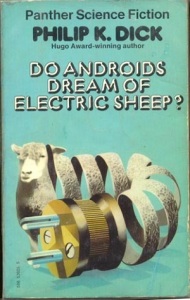Author: Philip K. Dick
ISBN: 1-85798-813-2
First Published: 1968
Blurb:
War had left Earth devastated. Through its ruins, bounty hunter Rick Deckard stalked, in search of the renegade replicants who were his prey. When he wasn’t ‘retiring’ them, he dreamed of owning the ultimate status symbol – a live animal. Then Rick got his big assignment: to kill six Nexus-6 targets, for a huge reward. But things were never that simple, and Rick’s life quickly turned into a nightmare kaleidoscope of subterfuge and deceit.
Review:
Philip K Dick’s dystopian science fiction novel is short, but deep, and still stands as a classic of the genre.
Set in a post-apocalyptic future where World War Terminus has decimated much of the world, Do Androids Dream of Electric Sleep follows Rick Deckard, a bounty hunter whose job it is to hunt down rogue androids. The majority of humanity, or at least those who could afford it, have escaped the nuclear fallout of the Earth for colonies on Mars. They use androids in these colonies for the menial labour, or the more dangerous jobs that humans don’t want to do. Some of these androids escape, fleeing to Earth where they hope to integrate themselves among real people. The novel takes place in a single day, following Deckard’s task of “retiring” six Nexus-6 androids.
The Nexus-6 androids are so advanced as to be barely distinguishable from humans. Indeed, the question of what makes humans human is a vital one explored by the novel. Bounty hunters in this world are forced to test androids using questions around morality and empathy, analysing eye dilation and other responses. While generally accurate, there is the risk that certain types of people, particularly those with mental health problems, will fail the test.
The concept of empathy being the one thing that can distinguish humans and androids is explored further through humanity’s newfound obsession with animals. A lot of species of animal went extinct after the nuclear war. To keep a real animal, and an electric counterpart, is a sign of status in this dystopian society. Indeed, Deckard’s main aspiration, and the goal which drives him to track down these dangerous androids, is to earn enough money to be able to buy a real animal to replace the electric sheep that he owns. The empathy felt for animals is explored, especially when androids are depicted cutting the legs off a spider to see how few legs it can survive with.
A further aspect of the novel which deepens it considerably is the use of religion. Mercerism is a new concept that arose after the war, which relies heavily on empathy. Followers link themselves up to an Empathy Box, a kind of collective consciousness that enables them to share in the suffering of the religion’s founder, Wilbur Mercer. Rocks are thrown at Mercer in this experience, and the pain is shared by all those linked through the Empathy Box.
The concepts make this short novel a very complex and deep one, exploring lots of aspects of our own society. Androids are used as a substitute for Otherness, an exploration of racism, slavery, and ostracism. They also act as a warning that technology could go too far and turn on its creators. The status symbol of owning animals reflects capitalism.
The novel is exciting, with a fairly fast pace, mostly thanks to its short length. It is full of subterfuge, intrigue and deception, and in the end leaves a few questions open for the reader to think about.
The characters are fairly interesting, though Deckard is a slightly unlikeable character. He’s quite sexist, abrupt, but it’s easy for the reader to empathise with him. His morality is grey, which serves to further the exploration of human empathy and android coldness. Isidore, a man with mental health issues, is more likeable. He is eager and kind. Like androids, he is looked down on by other people because of his lack of intelligence; he is called a “chickenhead” and viewed as subhuman. It serves as another exploration of human’s prejudices.
Overall, this is a novel that is definitely worth the read, even nearly fifty years after it was written. The writing is easy to read, the plot is exciting, and the substance is deep and thought-provoking.
Ratings:
Character: 8/10
Plot: 9/10
Style: 10/10
Overall: 8/10

Leave a comment